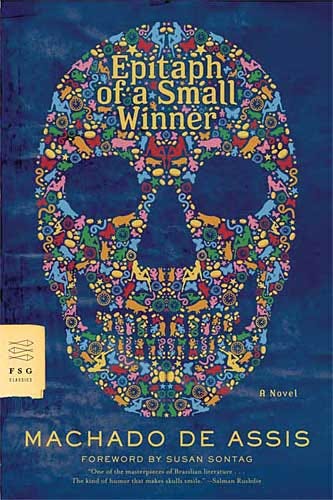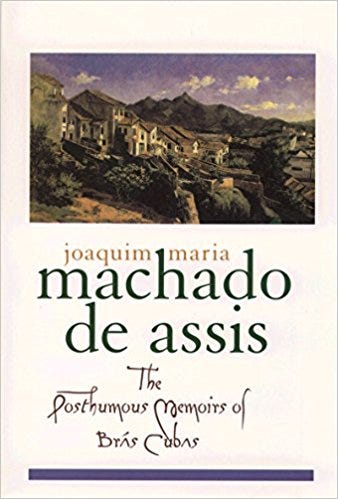Books & Culture
The Brazilian Novelist Who Inspired Borges, Márquez, and Amado
Machado De Assis’ 1881 “posthumous novel” is a seminal text for Latin American masters

A few months ago, I was talking books with a Brazilian colleague when she told me that the most important book written in the Portuguese language was a story from 1881 called Memórias Póstumas de Bras Cubas, or The Posthumous Memoirs of Bras Cubas, by Machado de Assis.
“How do you write a posthumous memoir?” I had asked her.
“Exactamente,” she told me.

As a reader, I sometimes have to remind myself that the written word existed in South America before the Latin American Boom of the 1960s and 1970s, the renaissance that brought about many of the masterful works of Jorge Amado, Jorges Luis Borges, Gabriel García Márquez, and Mario Vargas Llosa, among others. It’s an influence and an era that looms so large and monolithic that contemporary writers from the region can feel squeezed out by its largess, and the same can be said for the now-voiceless writers who came before: Who were the authors that inspired such an incredible outpouring of writing from an entire continent? One of them, undoubtedly, was Machado de Assis and his strange masterpiece, often translated in English as Epitaph of a Small Winner.
As a reader, I sometimes have to remind myself that the written word existed in South America before the Latin American Boom of the 1960s and 1970s.

Machado’s novel is told by its hero, Bras Cubas, from beyond the grave, starting with his descent into his feverish delirium and his eventual death from pneumonia at sixty-four years old. Only after his death does Cubas backtrack to detail the rest of his life, telling of his upbringing, his work as a bureaucrat, his few loves, and the many appearances of death to the people that Bras meets on his journey through life: a passenger on a ship, his mother, a black butterfly, his lover’s maid, and many others. This strange and humorous preoccupation with death is evident before even the first page, starting with the dedication, “To the first worm that gnawed my flesh.”
If Machado’s endeavor to write an amusing, absurd, inventive life story sounds familiar, it certainly should — in the opening lines, Cubas admits to “have adopted the free form of a Sterne or of a Xavier de Maistre,” referencing Tristram Shandy by Laurence Sterne and Voyage Around My Room by de Maistre. Cubas, much like Shandy, breaks through the page to engage with the reader, from taking hold of the dedication to promising to delete chapters left in the book to asking the reader to forgive him for sloppy writing. Whole pages are filled in with line drawings, entire chapters left blank in authorial distress, all amid the constant reminders that the words one is reading are not just those of a dead man, but those written by a man after he has died.
Putting Borges’ Infinite Library On the Internet
Machado’s willingness to break open the novel as a form could itself be reason enough to read a previously obscure Brazilian author, and it’s tempting to draw a line from Bras Cubas to later, beloved heroes of the Latin American Boom. For instance, there is the first-line announcement of the premeditated death of Santiago Nasar in García Márquez’s Chronicle of a Death Foretold, or Quincas Berro D’Água’s sudden posthumous conversations and reanimation in Jorge Amado’s The Double Death of Quincas Water-Bray. Amado, also from Brazil, certainly had Machado in mind while writing Double Death, a novel that begins with its hero dying a smiling death, and is demonstrative of the sort of gallows humor endemic to Brazilian culture.
Amado, also from Brazil, certainly had Machado in mind while writing Double Death, a novel that begins with its hero dying a smiling death, and is demonstrative of the sort of gallows humor endemic to Brazilian culture.
Machado, however, has Cubas do more than laugh at death. While Cubas is away at college in Portugal, he receives word that his mother is dying back home in Brazil, and when he arrives he is just in time to see her pass:
“The next morning, the imminence of death was inescapable. Long was her agony, long and cruel, with a minute, cold, repetitious cruelty that filled me with pain and stupefaction. It was the first time that I had seen anyone die.”
For all the humor and strangeness, Machado is able to couple it with the heartfelt woe and tragedy that comes with life in hindsight, and in that, Cubas’ lifetime feels fluid and circuitous and terribly fleeting. Near the end of his life, and the start of the memoir, Cubas has a fever dream where he meets a Mother Earth-like god named Pandora, who tells him, “‘I know; for I am not only life, I am also death, and you are soon to give me back what I loaned you.’” It’s a comfort, breaking death into an ebb and flow with life, and it’s something you can see frequently in García Márquez’s work as well. In addition to Chronicle, the opening of One Hundred Years of Solitude is a soldier remembering his childhood while facing a firing squad, and Love in the Time of Cholera’s first scene is a doctor discovering a suicide.
By having Cubas narrate from beyond the grave, Machado gives him a definite authority and irreproachable nature that mortal narrators lack:
“I do not deny that [public opinion] sometimes glances this way and examines and judges us, but we dead folk are not concerned about its judgment. You who still live, believe me, there is nothing in the world so monstrously vast as our indifference.”
While nominally a silly and jocularly styled story, the playfulness is couched in pathos and vision of a life and family in Brazil, what Cubas at one point describes as the “voluptuousness of misery.” By the simple nature of its framing, sorrow and regret are baked into the beautiful moments of a posthumous story, such as Cubas’ affair with his love, Virgilia:
Some plants bud and sprout quickly, other are slow and never reach full development. Our love was of the former type; it sprouted with such impetus and so much sap that in a short time it was the largest, the leafiest, and the most exuberant creature of the woods.
Any sort of love or triumph or beauty that occurs in Cubas’ life is terribly tinted by the foreboding truth of those first couple pages, Cubas’ coming demise.
Reading Epitaph of a Small Winner, there’s a tantalizing temptation to raise it up as some sort of anthropological “Lucy” for the explosion of beautiful and unique writing that came about in Latin America in the twentieth century, but it’s likely a false temptation. Machado wrote in Portuguese, and, in a frustrating revelation, his great work wasn’t translated into Spanish until the 1950s, eighty years after it was written, likely too late to have the sort of monumental impact and influence it largely deserves on the Spanish-dominated continent where Machado lived. While the delay of Machado’s arrival in Spanish is anomalous, it is, more importantly, isolating for a brilliant novel that is still lost in the borders of its own culture. Can a book still be beautiful and inventive if it stands alone?
While the delay of Machado’s arrival in Spanish is anomalous, it is, more importantly, isolating for a brilliant novel that is still lost in the borders of its own culture. Can a book still be beautiful and inventive if it stands alone?
By design, Cubas’ narrative is circular — at the close you are tempted to return to the beginning to see how it ends for Cubas, only to be drawn in again, an endless odyssey on the different ways to meet death. The spiraling nature of the story is itself Machado’s attempt to conquer our very mortality, a human interest and story so old it goes all the way back to Gilgamesh. While Gilgamesh sought a secret flower to bring back Enkidu, Machado’s manner of disarming death is much simpler: a quick laugh, a smile.









